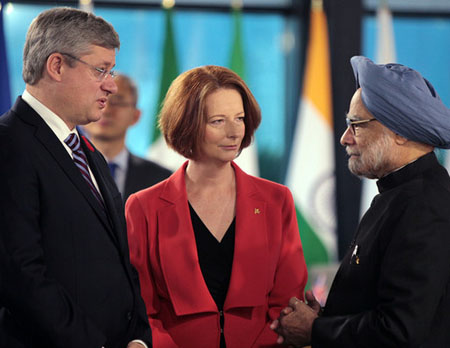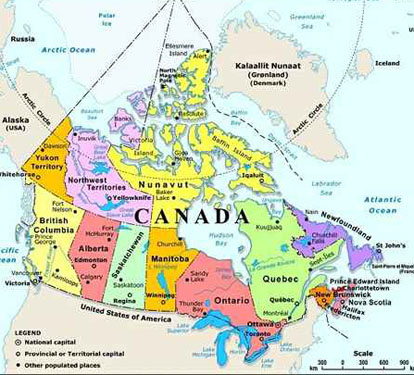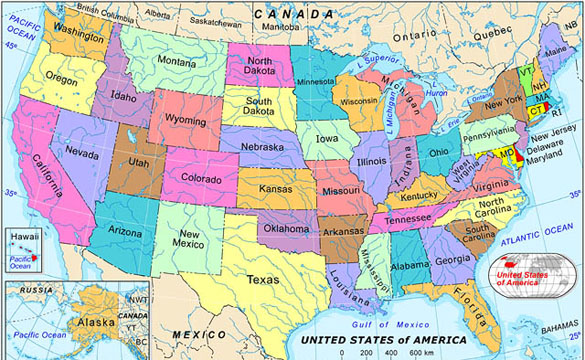PM Harper’s spin-doctor boasts about Canadian economy are wearing thin ..
Jul 12th, 2012 | By Counterweights Editors | Category: In Brief
Nicole Kidman may or may not be Australia’s greatest gift to Hollywood. But in the middle of 2012 it’s clear enough that the economy of her home and native land is doing considerably better than the economies of either the United States or Canada.
Australia’s June employment numbers were released today, and they caused some domestic concern: “Australia’s employers cut 27,000 jobs last month, sending the jobless rate higher.” The national unemployment rate actually increased to 5.2%, up from 5.1% in May 2012.
But hey, wait a minute. Our Canada-wide unemployment rate in June was 7.2%. As some like to stress, this was a full percentage point lower than the 8.2% national unemployment rate for June in the United States. Yet you don’t need an MA in economics to see that 7.2% is closer to the 8.2% rate in the American republic next door – said by many to be in such bad economic shape that Barack Obama is likely to loose this fall’s presidential election – than it is to the 5.2% rate down under.
How does this square with PM Harper’s Great Barbecue boast in his favourite city of Calgary last weekend: “New economic powers continue to rise and older ones, ones very much like our own country, continue to struggle. They’re weighed down by debts they can’t control, by entitlements you can no longer afford and growth that shows no signs of returning … Under our conservative government, Canada will not slip back the way so many other developed countries are slipping back … To succeed, what the world must become in the future, is what Canada is today”?

The Australian Labor Party government of Julia Gillard (centre) is presiding over the Australian economy at the moment. And based on PM Harper’s Great Barbecue logic, if Thomas Mulcair’s related NDP actually does win the 2015 federal election, the Canadian economy will do better than it is doing now – at least for Canadians who are looking for jobs.
Well … when you look at the June unemployment rates for Australia (5.2%) , Canada (7.2%), and the United States (8.2%), wouldn’t it make more sense to say : “To succeed, what the world must become in the future, is what Australia is today”? Oh and btw, the current federal government down under is in the hands of the Australian Labor Party – which is closer to what Mr. Harper would no doubt call a “socialist government” that can’t be trusted with the economy.
In fact, it is easy enough to explain why both Australia and (to a lesser extent) Canada are doing somewhat better economically than many other so-called “developed” or “economically advanced” or just “rich” countries lately. Both places have economies with prominent resource sectors. And the terms of trade for resource sectors in the current world economy are very favourable – despite a more general and perhaps even deepening economic malaise.
What is most remarkable is not that PM Harper would indulge in such dubious spin-doctor boasting about his “conservative government”’s alleged economic prowess. He is a politician who sees this kind of thing as the main part of his job. But why have so many who should know better been buying into the story, with so little due reservation and qualification?

Mexico’s greatest gift to Hollywood, Salma Hayek, waves at Savages recent LA Premiere. Strangely enough, at the moment the NAFTA country with the lowest unemployment rate is her home and native land!
There are no doubt assorted reasons – from shared ideological fervor to sheer laziness. It is easier to just file the talking points the Harper Conservatives hand out than it is to do a little research of your own on such places as Australia, Austria, Germany, Japan, Korea (South of course), Mexico (yes Virginia, Mexico!), the Netherlands, Norway, and Switzerland – all of which have had recent unemployment rates significantly below Canada’s, according to the Organization for Economic Co-operation and Development (OECD).
The good (but also unfortunately bad) news may be that at least some parts of the tide are starting to turn in some parts of the confederation. See, eg: “Canada’s economy: eight reasons to curb your enthusiasm from David Olive” ; “NDP counters Tory attack ads with video of their own … Stephen Harper says the economy is very fragile, and he’s right” ; “Cohn: Can this premier coax Stephen Harper out from under the porch?” ; and (though admittedly not from or about a part of Canada that Mr. Harper and others feel is “great”) “Why Toronto stocks are running out of steam.” The ultimate point of course is that you have to get your facts straight if you are finally going to make good policy – about the economy or anything else.
* * * *

Canada's premiers, including (l to r) Newfoundland and Labrador's Kathy Dunderdale, Prince Edward Island's Robert Ghiz, Nova Scotia's Darrell Dexter, and New Brunswick's David Alward, haven't had a First Ministers' Conference with Prime Minister Stephen Harper in more than three years. Andrew Vaughan / The Canadian Press.
The recent article by Martin Regg Cohn at the Toronto Star – “Cohn: Can this premier coax Stephen Harper out from under the porch?” – draws attention to another complication in the current Canadian economic picture. And this also throws quite a lot of cold water on Mr. Harper’s Great Barbecue boasting in Calgary this past weekend.
Cohn writes about an interview with Nova Scotia’s NDP premier Darrell Dexter, who will chair this summer’s provincial premiers’ meeting in Halifax, July 25—27 : “Dexter wants to rally Ontario’s Dalton McGuinty and other premiers on the economy … Dexter echoes McGuinty’s concerns about a high petro-dollar that prices Canadian manufacturing out of export markets, because Nova Scotians share our pain: A major paper mill has closed in his province, just as Northern Ontario has been denuded of pulp mills … ‘We don’t think it’s earth-shattering for someone to say, Yes, the high Canadian dollar affects our ability to compete,’ Dexter told me.”
You can see some of the particular concerns Nova Scotia will be bringing to the table in Halifax a few weeks hence by looking at the regional unemployment rates for June 2012. Canada-wide, the average unemployment rate was 7.2%. But it was considerably higher in all four provinces of Atlantic Canada: Newfoundland and Labrador – 13.0% ; Prince Edward Island – 11.3% ; Nova Scotia – 9.6% ; and New Brunswick – 9.5%.
You can say of course that this is an old story, which what now amount to generations of Canadian regional economic development policy have tried to deal with. Mr. Harper’s government doesn’t quite seem to believe in this kind of policy. Its solution to high unemployment in Atlantic Canada appears to be for Atlantic Canadians to move to Western Canada – and perhaps especially to Alberta and Saskatchewan, where the traditional Canadian resource economy is now blooming most beautifully.
There can be no doubt that both Alberta and Saskatchewan are doing very well at the moment. The June 2012 unemployment rate for Alberta was a mere 4.6%. In Saskatchewan it was only slightly higher at 4.9%. The third Canadian Prairie Province of Manitoba is not doing too badly either – the same as Australia at large, in fact, at 5.2%.
While not as badly off as Atlantic Canada, on the other hand, the more diverse regional economies of the three geographically and demographically largest Canadian provinces are not doing as well as the more resource-focused Prairies Provinces – although each has improved somewhat between May and June of 2012.
 BC has moved from 7.4% unemployment in May to a notably improved 6.6% in June. Each of Ontario and Quebec improved less dramatically, from 7.7% to 7.6% over the same period. As in Atlantic Canada to a still greater degree, however, in none of the three largest provinces does Stephen Harper’s Great Barbecue boasting of this past weekend ring with the same kind of conviction as it does in the Prairie Provinces.
BC has moved from 7.4% unemployment in May to a notably improved 6.6% in June. Each of Ontario and Quebec improved less dramatically, from 7.7% to 7.6% over the same period. As in Atlantic Canada to a still greater degree, however, in none of the three largest provinces does Stephen Harper’s Great Barbecue boasting of this past weekend ring with the same kind of conviction as it does in the Prairie Provinces.
It is similarly no doubt not surprising that you can see these economic numbers reflected in no small degree by the political numbers reported in ThreeHundredEight.com’s “June 2012 federal polling averages” – which also show (once again) the NDP ahead Canada-wide at 34.8%, followed by Mr. Harper’s Conservatives at 32.6%, the federal Liberals at 20%, the BQ at 6% and the Green Party at 5.9%.
* * * *
As a final intriguing footnote here, recent regional unemployment rates in the United States have at least some parallels with regional unemployment rates in Canada. And this also suggests that what is at work is something more fundamental (and even more resource-economy-geographic, if you like) than Stephen Harper’s current “conservative government” north of the 49th parallel.
 The most recent month for which state unemployment rates are currently available is May 2012. And the national rate for May was the same 8.2% as in June. If you look at the seven US states which more or less lie below (or due south of) the three Canadian Prairie Provinces, however, they all had unemployment rates significantly enough below the national average.
The most recent month for which state unemployment rates are currently available is May 2012. And the national rate for May was the same 8.2% as in June. If you look at the seven US states which more or less lie below (or due south of) the three Canadian Prairie Provinces, however, they all had unemployment rates significantly enough below the national average.
Moving from east to west (in north-south sectors, so to speak) the May 2012 rates were: Minnesota – 5.6% ; Iowa – 5.1% ; North Dakota – 3.0% ; South Dakota – 4.3% ; Nebraska – 3.9% ; Montana – 6.3% ; and Wyoming – 5.2%.
Now, what would anyone think if President Obama were to hold his own Great Barbecue event in Great Falls, Montana (say), or perhaps Rapid City, South Dakota (to say nothing of Houston or Dallas in Texas, with a May 2012 regional unemployment rate of 6.9%!), and declare that thanks to his liberal government in Washington, the economy of the USA today was percolating along rather nicely, thank you very much. And, to succeed, what the world must become in the future, is what the United States of America (still) is today??????


I’m a conservative at heart but I really can’t say I feel our current economy (for good, or bad) exists due to Stephen Harper. Our country is primarily based on taking stuff out of the ground and selling it to someone who then makes something with it. As long as their is a demand for our stuff and the presiding government doesn’t do something drastic it feels like we almost keep going in the same direction.
For a long , long time now, the Australian economy has been doing a LOT better than the Canadian, to the extent that on trend figures, and with a population 50% LESS than Canada, the Australian economy on the TREND figures ( if they continue) will overtake the Canadian economy within 5 years. The minimum adult hourly rate in Australia is also around 50% MORE than in Canada AND although Canadian web sites just don’t say it ( why???) Australia is one of only 8 countries left in the world that look likely to hold on to a AAA rate. Yet on Canadian web sites they wont mention this and espouse how well Canada is doing – why isn’t the truth available on Canadian web sites??? Are they being monitored and manipulated?